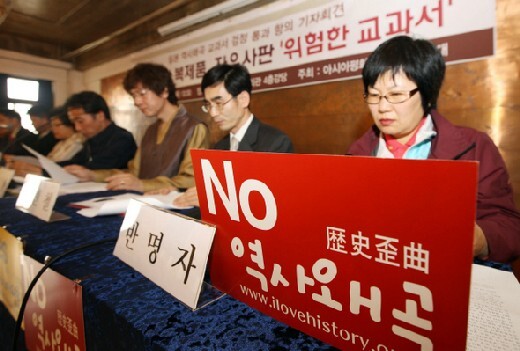hankyoreh
Links to other country sites 다른 나라 사이트 링크
Newly approved Japanese textbook edition receives tempered reaction from South Korea

Japan’s Ministry of Education, Culture, Sports, Science and Technology gave its formal approval Thursday for a middle school history textbook written by the Society for the Creation of New History Textbooks (Tsukurukai), and published by Jiyusha. The Jiyusha edition of the “New History Textbook” has almost identical content with the edition previously written by Tsukurukai and published by Fushosha, including material that legitimizes colonial rule by the Japanese empire and denies its war of aggression.
In response to the approval of the Jiyusha edition, spokesperson Moon Tae-young of South Korea’s Ministry of Foreign Affairs and Trade (MOFAT) issued a stern criticism Thursday, although actual diplomatic measures remained somewhat muted.
In Moon’s statement, he said the government “strongly protests” the approval of this textbook and “urges fundamental revisions.” Analysts indicate this is a stronger reaction than the 2005 statement issued by MOFAT, which approved the Fushosha edition. At that time, there was no use of the word gangryeokhi (“strongly”), and the expression yugam-eul pyosihanda (“expresses dismay”) was used instead of hanguihanda (“protests”). The criticism issued for this edition, at least registered formally, is greater.
Apart from Moon’s formal statement, diplomatic measures taken by the South Korean government indicate a reluctance to allow the issue to escalate. On Thursday afternoon, the government had Cho Tae-yong, MOFAT’s Northeast Asian Affairs Bureau chief, call Takahashi Reiichiro, senior minister at Japan’s Embassy in Seoul, to express objections. At the time of the 2005 Fushosha textbook edition furor, then Vice Minister for Foreign Affairs and Trade Lee Tae-sik called Takano Toshiyuki, then Japanese Ambassador to South Korea, and demanded the deletion of a passage in the civics textbook referring to South Korea’s “illegal occupation” of the island of Dokdo. Analysts have also noted that the level of diplomatic protocol taken on this issue has dropped dramatically indicated by of the status of the individuals issuing and receiving objections.
“At that time (in 2005), it was an authorization for eight textbook sets,” said a MOFAT official, adding, “it’s a different situation now” referring to the sole textbook edition. Scholars are arguing that the textbook issue is not one that should be addressed in terms of numbers, as it is closely connected with historical understandings regardless of whether eight textbook sets are at issue or just one.
Analysts are also judging the South Korean government’s reluctance as connected to some extent with the political determination to maintain an atmosphere of closer South Korean-Japanese relations following the inauguration of President Lee Myung-bak. Speaking at a reception held for ethnic Koreans in Japan prior to his summit with then Japanese Prime Minister Fukuda Yasuo on April 20, 2008, President Lee emphasized “future-oriented South Korea-Japan relations” and said that he was “not going to demand that Japan apologize all the time.” In his celebratory address during the March 1 holiday, Lee also avoided the traditional reference of “sending a message to Japan.”
Please direct questions or comments to [englishhani@hani.co.kr]
Editorial・opinion
![[Column] Season 2 of special prosecutor probe may be coming to Korea soon [Column] Season 2 of special prosecutor probe may be coming to Korea soon](https://flexible.img.hani.co.kr/flexible/normal/500/300/imgdb/original/2024/0426/3317141030699447.jpg) [Column] Season 2 of special prosecutor probe may be coming to Korea soon
[Column] Season 2 of special prosecutor probe may be coming to Korea soon![[Column] Park Geun-hye déjà vu in Yoon Suk-yeol [Column] Park Geun-hye déjà vu in Yoon Suk-yeol](https://flexible.img.hani.co.kr/flexible/normal/500/300/imgdb/original/2024/0424/651713945113788.jpg) [Column] Park Geun-hye déjà vu in Yoon Suk-yeol
[Column] Park Geun-hye déjà vu in Yoon Suk-yeol- [Editorial] New weight of N. Korea’s nuclear threats makes dialogue all the more urgent
- [Guest essay] The real reason Korea’s new right wants to dub Rhee a founding father
- [Column] ‘Choson’: Is it time we start referring to N. Korea in its own terms?
- [Editorial] Japan’s rewriting of history with Korea has gone too far
- [Column] The president’s questionable capacity for dialogue
- [Column] Are chaebol firms just pizza pies for families to divvy up as they please?
- [Column] Has Korea, too, crossed the Rubicon on China?
- [Correspondent’s column] In Japan’s alliance with US, echoes of its past alliances with UK
Most viewed articles
- 1[Column] Season 2 of special prosecutor probe may be coming to Korea soon
- 2‘We must say no’: Seoul defense chief on Korean, USFK involvement in hypothetical Taiwan crisis
- 3Division commander ordered troops to enter raging flood waters before Marine died, survivor says
- 4Is N. Korea threatening to test nukes in response to possible new US-led sanctions body?
- 5Is Japan about to snatch control of Line messenger from Korea’s Naver?
- 6No good, very bad game for Korea puts it out of Olympics for first time since 1988
- 7[Editorial] Korea’s surprise Q1 growth requires objective assessment, not blind fanfare
- 8Korea’s 1.3% growth in Q1 signals ‘textbook’ return to growth, says government
- 9N. Korean delegation’s trip to Iran shows how Pyongyang is leveraging ties with Moscow
- 10Amnesty notes ‘erosion’ of freedom of expression in Korea in annual human rights report